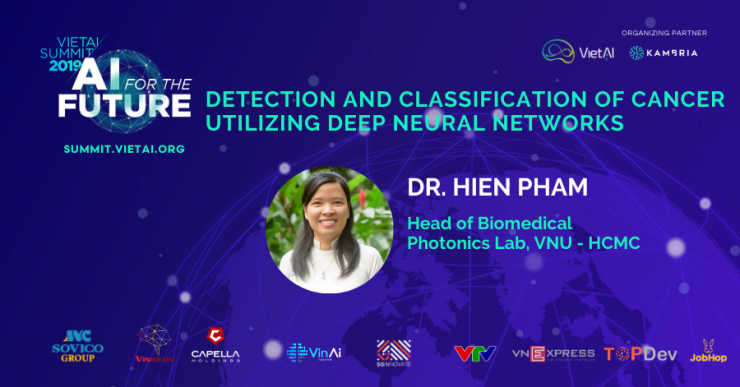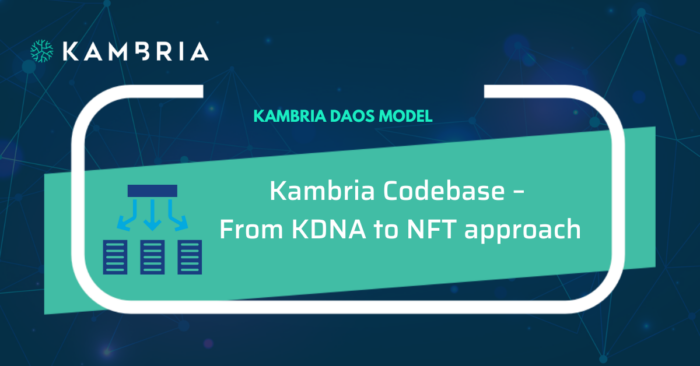As part of the VietAI Summit 2019, Dr. Hien Pham gave a presentation about the Detection and Classification of Cancer Utilizing Deep Neural Networks.
Cancer is a leading cause of death worldwide, especially in low-to-mid income countries like Vietnam. Yet our cancer prognosis process is still inaccurate due to many factors. Dr. Pham's work proposes using a deep learning approach with Convolutional Neural Networks (CNN) to address the problem of classifying breast, blood, and lung cancer from a histopathological image or chest x-ray image dataset. The performance of this model indicates the high potential of CNN to improve the overall classifying accuracy of cancerous breast, blood, and/or lung tissue, especially when supplied with more data of cancer cells and tissues.
Dr. Pham shared the results of her research team on four related research topics: 1) how to detect and classify breast cancer, 2) 14 thoracic diseases, 2) brain tumors, 3) leukemia and 4) diarrhea. Below is a graphic related to breast cancer which provides a better understanding of Dr. Pham’s research.
As we know, breast cancer is the most common cancer among women. 1.7 million new cases were diagnosed in 2012. In 2015, about 570,000 women died from breast cancer. In Vietnam, there are over 10,000 cases of female cancer.
Based on these statistics, Dr. Pham and her research group are trying to apply the CNN to cancer detection and focus more on difficult cases. Technically speaking, CNN has powerful feature extraction and expression capabilities that can automatically extract high-level semantic features from images and are helpful for breast cancer segmentation and pathological grade discrimination. But this method needs to be improved based on big, relevant data so as to produce better results.
The Breast Cancer Histopathological Image Classification is a publicly available dataset. It contains 7908 microscopic images collected from 82 parties. There are 2,480 benign and 5,429 malignant samples in a size of 460 X 700 X 3, 8-bit depth in each channel and in PNG format, which is shown in the picture below.
The advantage of using deep learning in cancer detection is to explore the possibility of learning functions directly from the input data, avoiding hand-crafted functions. The key concept of deep learning is to discover multiple levels of representation, with the goal of higher-level feature representations with more abstract data semantics.
Convolutional Neural Networks (CNN), a special deep learning technology, have achieved success in image classification problems, including medical image analysis. The key methodology of Dr. Pham’s model is using a 2-stage model consisting of Segmentation, DenseNet Extractor plus Binary Classifier along with CAM ( Class Activation Maps) to color the final results to make sure the doctors can read the images and focus on the difficult cases. Dr. Pham also applied this model in detecting other cancers like lung cancer.
Because artificial intelligence is currently in its early stages, it useful for assisting scientific research and cancer drug research and development rather than clinical diagnosis. But the desire to save others will always push humankind to push the boundaries.
To watch a video of Dr. Pham's complete presentation about the detection and classification of cancer, click the image below.
To access all of Dr. Pham slides for this presentation about the detection and classification of cancer, head over to Kambria’s Resource Library. The Resource Library can be accessed for free by community members who own KAT tokens. Simply register for the Kambria platform by clicking “Login/Register” in the top right-hand side of the screen. Then choose “Library” to access materials from the Summit.
About VietAI Summit 2019
More than 450 people attended VietAI Summit 2019, “AI for The Future,” organized by VietAI and Kambria. With a program featuring many reputable guest speakers from big tech companies such as Google Brain, Toyota Research Institute, Kambria, NVIDIA, VinAI Research, Vinbrain, Deakin University, and Vietnam National University HCMC, we received many fresh insights into the exciting state of AI research and application, not just in Vietnam, but also around the world. To receive an invitation to VietAI Summit 2020, Like the VietAI Facebook page and Like the Kambria Facebook page.
To read more tech articles from VietAI Summit 2019, click here.












